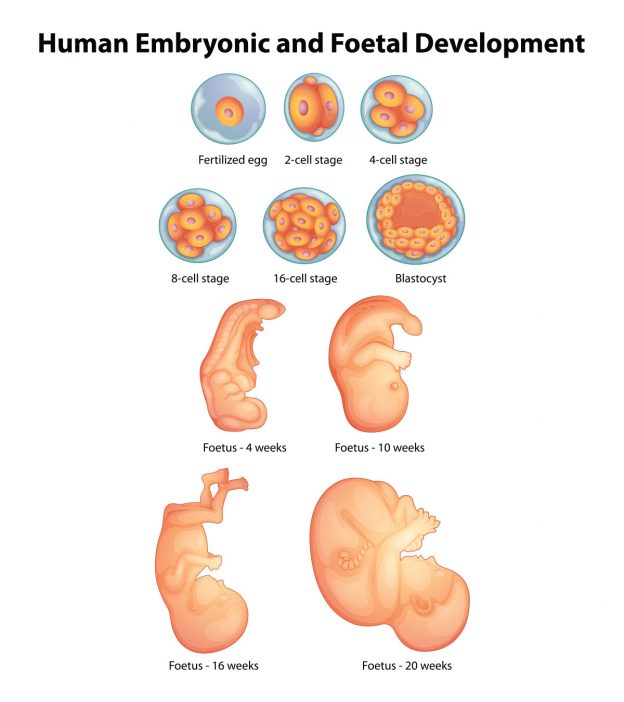
The nine months of pregnancy is an incredible journey for both mom and baby. Every week brings new developments and changes in the little life growing inside you. As a mom-to-be, it’s understandable that you’re curious about what’s going on inside your womb. That’s why we’ve created this guide to walk you through the baby womb development week by week.
Table of Contents
Week 1-4: Conception and Implantation
The first four weeks of pregnancy are counted from the first day of your last menstrual period (LMP). During this time, your body prepares for conception and ovulation occurs. If sperm fertilizes the egg during this period, then it implants in the uterus lining. Your baby at this stage is just a tiny bundle of cells that will eventually form the embryo.
Week 5: Embryo Development Begins
During week five, embryonic development begins. The embryo is about the size of a sesame seed and starts to form different layers that will eventually become the different parts of your baby’s body like the heart, brain, and lungs. The umbilical cord, which connects the embryo to the placenta, also starts to form.
Week 6-8: Organs Start Forming
The next three weeks are a critical time for your baby’s development. Major organs like the heart, kidneys, liver, and lungs begin to form during this time. At around week six, your baby’s heartbeat can be detected by an ultrasound. By week eight, your baby is about the size of a raspberry and has all the basic organs in place.
Week 9-12: Baby’s Features Begin to Take Shape
During this period, your baby’s features start to take shape. The face, ears, nose, and eyes start to form. Your baby’s tiny fingers and toes also start to develop. By week 12, your baby is about the size of a lime and can open and close its fists.
Week 13-16: Baby Becomes More Active
During these weeks, your baby becomes more active and starts to move around in your womb. Your baby’s sex can be determined during this time. By week 16, your baby is about the size of an avocado and has a fully formed digestive system.
Week 17-20: Baby’s Senses Develop
Your baby’s senses start to develop during this period. Your baby can taste, hear, and see light. By week 20, your baby is about the size of a banana and can suck its thumb.
Week 21-24: Baby’s Lungs Start to Develop
Your baby’s lungs start to develop during this period. Your baby also starts to gain weight and develop fat. By week 24, your baby is about the size of an ear of corn and has a chance of survival if born prematurely.
Week 25-28: Baby’s Brain Develops Rapidly
Your baby’s brain develops rapidly during this period. Your baby can also blink and respond to sound. By week 28, your baby is about the size of a large eggplant and has a good chance of survival if born prematurely.
Week 29-32: Baby’s Movement Becomes More Coordinated
During this period, your baby’s movement becomes more coordinated. Your baby’s skin also becomes less wrinkly and more smooth. By week 32, your baby is about the size of a squash and starts to prepare for birth by moving into the head-down position.
Week 33-36: Baby’s Immune System Develops
Your baby’s immune system starts to develop during this period. Your baby also starts to shed the fine hair (lanugo) that covered its body. By week 36, your baby is about the size of a honeydew melon and is almost fully developed.
Week 37-40: Baby Is Ready for Birth
During this final period, your baby is ready for birth. Your baby’s lungs are fully developed, and your baby has gained enough weight to thrive outside the womb. Your due date is calculated at 40 weeks, but many babies are born a week or two early or late.
Frequently Asked Questions
Q: What can I do to support my baby’s development during pregnancy?
A: Eating a healthy diet, getting enough rest, staying active, and avoiding harmful substances like alcohol and tobacco can all support your baby’s development during pregnancy.
Q: Is it safe to have sex during pregnancy?
A: In most cases, sex during pregnancy is safe. However, it’s important to talk to your doctor if you have any concerns or complications like bleeding or placenta previa.
Q: When should I start prenatal care?
A: Prenatal care should ideally start as soon as you find out you’re pregnant. Regular prenatal care can help ensure the health and well-being of both you and your baby.
Q: What should I do if I experience unusual symptoms during pregnancy?
A: If you experience unusual symptoms like bleeding, severe cramping, or decreased fetal movement, contact your healthcare provider immediately.
Q: What happens if my baby is born prematurely?
A: If your baby is born prematurely, they may need additional medical care and support. Your healthcare provider can discuss the best course of action for you and your baby.
In conclusion, every week of pregnancy brings new developments and changes in your growing baby. It’s important to take care of yourself and your baby during this incredible journey. With regular prenatal care and healthy lifestyle habits, you can support your baby’s development and prepare for a happy and healthy birth.
